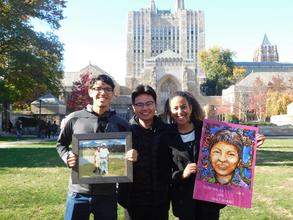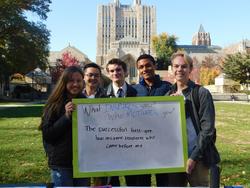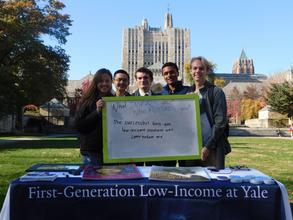
Peer Mentorship Groups for Incoming First-Year/FGLI Students
A partnership between the Academic Strategies Program and the FGLI Community Initiative
Welcome to Yale! Your admission is a testament to your hard work and the unique talents, experiences, and interests you’ve cultivated so far. You already have the intellectual curiosity, dedication, and enthusiasm that will help you make the most of your Yale College experience.
For many first-year students, learning to navigate the expectations and resources offered at a top university can be challenging. Every university has its own culture and unwritten rules—what some educational researchers call the “hidden curriculum.” Some parts of this hidden curriculum include:
- What are faculty office hours? Why should I go to them? What should I talk about with faculty during office hours?
- What is the difference between high school math homework and college-level problem sets? Why do I need to meet with other students and faculty/teaching fellows to complete my problem sets?
- What’s a residential college dean? What’s a FroCo? What is a college advisor? Who should I go to for what advice?
- How do I balance paid work and my studies?
- When and how should I should start planning for summer study abroad and internships?
While your high school may have prepared you well for math, English, chemistry, and history, many high schools don’t have the resources to introduce students to university culture and how students are expected to interact with faculty, staff, and peers to make the most of their educations.
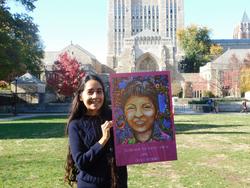
Yale is one of many Ivy League colleges that now offer guides to navigating this hidden curriculum. Our Peer Mentoring Groups for First-Year Students are led by junior and senior peers who identify as first in their families to go to an Ivy-League college and who had to navigate the hidden curriculum as first-year students. They can share with you the knowledge they’ve gained through their experiences and help you develop strategies that enable you to achieve your goals at Yale.
Students participating in the program will meet with three other students and an assigned peer mentor. Students will be grouped together according to general academic interests (STEM, social sciences, arts & humanities). Small groups will meet 7 times during the fall and 5 times during the spring, and meeting times will be arranged around the participants’ schedules. Each small group meeting will last one hour. In addition, there will be three events for the whole group: a kick-off event in early September, a panel on leadership and extracurriculars in late September, and a session on career exploration in October. Invitations to the program will be sent out before classes begin in August. If you did not receive an invitation by August 28, 2020, and would like to be considered for the program, please send an email to michael.fitzpatrick@yale.edu.
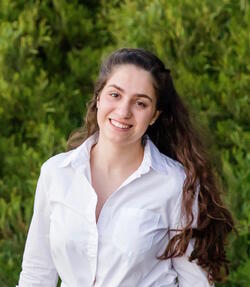
Ava Niknahad, Lead Mentor for Peer Mentorship Groups
“I am currently a senior at Yale, originally from Tehran, Iran, and now living in Los Angeles, California. In Iran, I had to declare a major as a sophomore and only take mandatory classes. So when I moved to the U.S. and then arrived at Yale, I was overwhelmed with choosing courses. As a first-generation college student in the U.S., I had to learn how to be honest with myself about what my passions are and become confident in my pursuit of them. I also had to learn how to manage my time for courses and extracurricular activities while also helping my family back home. In these times, mentorship played a vital role in providing a judgment-free environment where I could gradually build the necessary skills to tackle these challenges. Academic Strategies Peer Mentors can help you do the same and more so you can both reach your goals and find a supportive community at Yale. I’m excited to help lead this program and welcome all of you!”
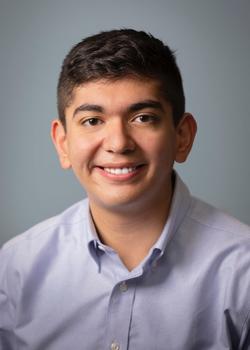
Jorge Anaya, Woodbridge Fellow, the FGLI Community Initiative
“I attended Port of Los Angeles High School, a small charter school in San Pedro, California. Though I am extremely grateful for my time there, my high school lacked some important resources, such as Advanced Placement (AP) STEM courses, a library to conduct research and/or leisurely read, and a well-developed college counseling center. During my first weeks at Yale, I worried about how I would fare in Yale’s STEM courses, and I felt pressure to secure an on-campus job in order to decrease my financial stresses. Having the opportunity to learn from individuals with a similar background through the FGLI Peer Mentors Group would have been instrumental in my personal and academic growth as an undergrad. Hopefully this program is able to equip you with some of the tools necessary to succeed at Yale!”
Questions? Contact Dr. Karin Gosselink, Director, Academic Strategies Program and co-supervisor of the FGLI Community Initiative: karin.gosselink@yale.edu
Want more advice on the transition into Yale? Check out our Academic Strategies First-Year College Transition page: https://poorvucenter.yale.edu/undergraduates/academic-strategies/first-years-workshops-videos-events
Learn more about the Community Initiative for first-generation and/or low-income students here: https://fgli.yalecollege.yale.edu

